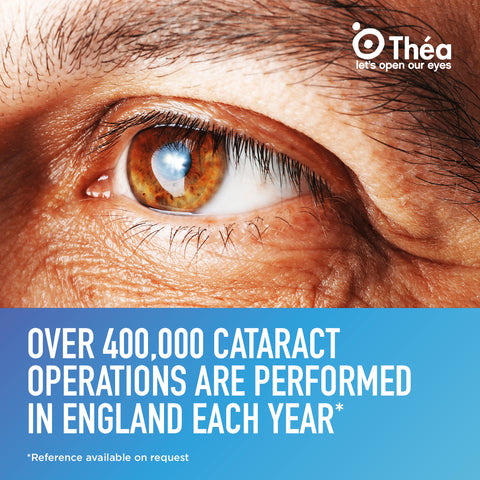Preparing your eyes for cataract surgery

It’s normal to feel a little nervous or apprehensive at the thought of surgery. Cataract surgery is one of the most common procedures in the UK with over 400,000[1] surgeries done in England alone every year. As an aging population this type of surgery is only set to grow and is something many of us might face in the future.
A cataract happens when the lens within your eye becomes cloudy over time. As protein builds up in the lens of the eye it becomes progressively opaquer and cloudier, creating blurred or compromised vision. These cloudy patches can gradually build up over time as part of the natural ageing process. If you have been advised to have cataract surgery, it’s likely that this clouding is now affecting your vision and could begin to affect your day-to-day life.
What to expect with surgery?
Cataract surgery removes the cloudy lens and replaces it with an artificial lens that should not need to be changed for the rest of your life. Surgery is the only option to treat cataracts, although the timing of surgery is different for everyone depending on several factors:
- how badly your sight is affected
- whether you have any other eye conditions
- if you only have sight in one eye
- how you use your sight from day to day.
Feeling nervous?
If you’re feeling nervous about your upcoming surgery, speak to your optometrist or ophthalmologist about what to expect on the day. A practical step you can take is to get them to talk you through the benefits and risks of the procedure.
Cataract surgery is a quick procedure that is usually carried out with local anaesthetic – meaning you can leave the hospital on the same day as the operation. Cataract surgery improves the vision of nearly all patients and has one of the highest success rates of all surgery. Although it can take a few weeks to fully recover, you will be able to go about your daily life as your eye is healing.
How can you prepare your eyes for surgery?
Conditions such as Blepharitis (inflammation of the eyelids) can lead to cancellation of cataract surgery on the day if not well managed. You may be advised to use an eyelid cleansing product such as Blephaclean, this will help to keep your eyelids clean in preparation for cataract surgery. If you have been diagnosed with Blepharitis be sure to use Blephaclean for at least 2 weeks prior to your surgery.
Caring for your eyes
After your operation you will be prescribed several medications in the form of eye drops/ointments, meaning part of your recovery is in your hands. It is important to use these medications exactly as prescribed to minimise risk of any infection or discomfort.
It’s normal for your eyes to feel dry or gritty following cataract surgery, with 37.4%[2] of patients, without pre-existing dry eye, reporting these symptoms following the operation. This is something you can manage yourself - you may have been recommended to use a lubricant drop by your eye care professional such as Thealoz Duo. Thealoz Duo is a long-lasting lubrication drop which helps to soothe the symptoms of dry eye and can be safely used alongside most prescribed medication (you should always refer to the leaflet of the medicines to check compatibility and the correct order to use the drops).
You can use Thealoz Duo before the operation to help reduce the likelihood of experiencing dry eyes post-surgery[3].
For our full product range visit our shop
[1] Reference. England NHS
https://www.england.nhs.uk/wp-content/uploads/2022/07/Making-a-decision-about-cataracts.pdf
[2] Reference. Miura. M, et al (2022) Opthalmol Ther 11:1309-1332
https://doi.org/10.1007/s40123-022-00513-y
[3] Reference. Menucci. R, et al (2021) J.Clin. Med. 10:4699
https://doi.org/10.3390/jcm10204699
